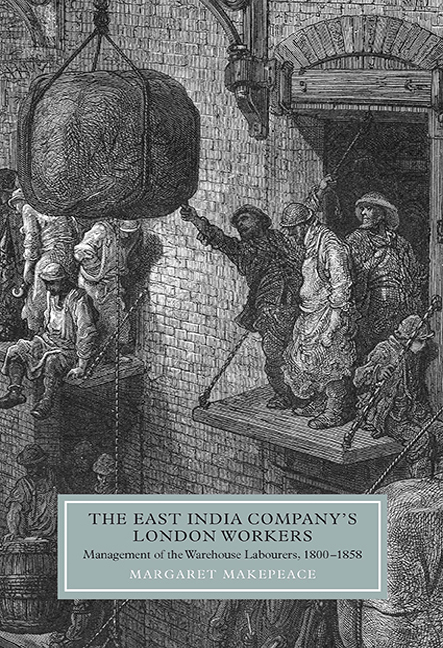Book contents
- Frontmatter
- Contents
- Figures and tables
- Dedication
- Acknowledgements
- Abbreviations
- 1 Introduction
- 2 The East India Company Warehouses
- 3 The Warehouse Labourers
- 4 Management Strategies: Incentives, Rewards and Benevolence
- 5 Management Strategies: Systems of Internal Control
- 6 The Royal East India Volunteers: The ‘Union of Civil and Military Dependence’
- 7 The Relationship Between the East India Company and its London Warehouse Labourers
- 8 The Warehouse Closures
- 9 Management of the Warehouse Labourers and Pensioners 1838–1858
- Conclusion: ‘Good Masters to the Lower Class of Their Dependents’
- Bibliography
- Index
6 - The Royal East India Volunteers: The ‘Union of Civil and Military Dependence’
Published online by Cambridge University Press: 13 April 2017
- Frontmatter
- Contents
- Figures and tables
- Dedication
- Acknowledgements
- Abbreviations
- 1 Introduction
- 2 The East India Company Warehouses
- 3 The Warehouse Labourers
- 4 Management Strategies: Incentives, Rewards and Benevolence
- 5 Management Strategies: Systems of Internal Control
- 6 The Royal East India Volunteers: The ‘Union of Civil and Military Dependence’
- 7 The Relationship Between the East India Company and its London Warehouse Labourers
- 8 The Warehouse Closures
- 9 Management of the Warehouse Labourers and Pensioners 1838–1858
- Conclusion: ‘Good Masters to the Lower Class of Their Dependents’
- Bibliography
- Index
Summary
the military overtones of the warehouse management structure with its discipline and hierarchical organization were strengthened by the existence of the regiments of Royal East India Volunteers which were embodied at two separate periods, from 1796 to 1814 and then from 1820 to 1834. Although the warehouses had always been guarded by watchmen with firearms, the establishment of a Volunteer infantry corps during the French Wars using civilian servants as soldiers was a key development in the East India Company's management of its London operations, marking a definite shift in the labourers’ duties from commercial activities into a hybrid role involving regular military and political functions. The labourers who served as privates in the Volunteers were officered by their warehouse managers, which prompted The Times to remark: ‘The union of civil and military dependence is … highly conducive to subordination and punctuality.’
The formation of the Royal East India Volunteer regiments was not the first time that Company labourers had been used for military and political rather than purely commercial ends. In the autumn of 1779, with unrest caused by the war against the American colonies and agitation by radical politicians, the Duke of Northumberland proposed that all ablebodied men employed in the Company warehouses should be properly trained in the use of firearms. The Committee of Correspondence believed that this would be a valuable public service as well as being of particular benefit to the Company. The Court asked a Joint Committee of Shipping and Warehouses to prepare a proper plan for implementing the scheme. It was decided to drill the labourers, together with any other servants thought suitable, in the manual exercise, platoon exercise, street firing and charging with bayonets. The Company would apply for the services of five sergeants and ten corporals to instruct the labourers, with the officers being under the command of Colonel Edward Windus.
Justification for the Company's decision to ensure that the labourers had basic military skills came in the following year when the Gordon Riots broke out in London, resulting in hundreds of deaths and thousands of pounds worth of damage to property. Rioters held out against the civil and military authorities for almost a week in June 1780.
- Type
- Chapter
- Information
- The East India Company's London WorkersManagement of the Warehouse Labourers, 1800–1858, pp. 113 - 139Publisher: Boydell & BrewerPrint publication year: 2010



